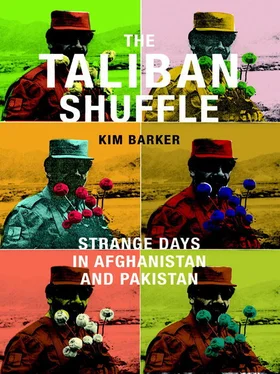A few weeks later, I flew to southern Helmand Province to watch Illinois soldiers posted there help eradicate poppies. This was part of NATO’s new approach to drugs, the first time that any foreign troops had been involved in eradication, even if they only guarded the Afghan police riding tractors that ripped up the poppies. The soldiers’ surroundings were stark, and they certainly didn’t get any Super Bowl Sunday pizza. Instead, they were attacked almost every time they left the base—by the Taliban, the farmers, the villagers. Outside the base, fields of newly planted poppies stretched forever, beautiful carpets of green. People in Washington sometimes tried to portray poppy farmers as small guys, eking a living from the land. In Helmand, at least, these were corporate drug farms.
The Afghans and their international guards made a show of clearing a patch of poppies right outside the base gate—a patch they had been saving to show off for the media and top Kabul luminaries, a patch with limited risk of attack. A man from the U.S. embassy, thrilled to be outside, wore a patch on his flak vest: AMERICA, FUCK YEAH, it said, quoting the movie Team America . Was there a better description for what we were trying to do here? If so, I had yet to hear it.
CHAPTER 26
WHEN THE MAN COMES AROUND
In some ways, I hoped Obama would be the savior. After he switched the war’s focus from Iraq to this region, I thought that maybe everything would turn around, that Afghanistan and Pakistan would suddenly reverse course and miraculously start improving. Selfishly, I figured my job was safe. After all, Obama was from Chicago, as was my newspaper, and if this region was seen as the most important foreign story in the world in the coming years, surely the Tribune would need its own correspondent. So I launched my own tactical surge in preparation for the upcoming U.S. surge. I knew the United States could do only so much inside stubbornly sovereign Pakistan; I planned to spend as much time as possible following the Americans in Afghanistan. But I needed to cut my costs. I decided to move from my giant house in Islamabad to a friend’s house and use the savings to rent a room in Kabul. I decided to cut my fixer costs, and offer Farouq a take-it-or-leave-it deal of $1,600 a month, regardless of whether I was in Afghanistan. For most Afghans, this was a fine salary. But not for Farouq.
He was already upset with me for a variety of reasons. Given my stress, I had been short with him, not treating him like before. I was treating him like my employee—not like my friend. I was tired of worrying about money and scrimping like a freelancer. I was tired of stacking all my interviews over a few days, so I could pay Farouq for only a few days’ work, which meant he was always on call, unable to work for anyone else. I was tired of his occasional macho rants. Given the boom in interest in Afghanistan, Farouq could make much more money anywhere else. Both of us were frustrated.
“You can think about it,” I said, after making my offer.
“No, Kim. I can tell you what I think right now. I can’t work for that amount of money. I’m sorry.”
“I’m sorry, too,” I said.
We pledged to stay friends, but I knew we wouldn’t talk for a while. We were both raw, mainly over the irony that when the world finally realized that Afghanistan was circling the drain, so were both of our jobs. In slight shock over my bold move, I hired someone else.
I flew back to Pakistan, where Nawaz Sharif again made noise about restoring the judges fired sixteen months earlier by Musharraf. That old story—he was like Musharraf with the miscreants. But President Zardari had just punched himself in the eye by removing Sharif’s brother as the head of the Punjab government. A planned march by the long-suffering lawyers—who by this point had been in a monotonous state of protest for almost two years, occasionally staging symbolic three-hour hunger strikes—suddenly had momentum. The Sharifs threw all their significant political weight behind the lawyers. I sent a text message to Sharif, asking him to call.
“I haven’t seen you for a long time,” he said when he called that Friday evening. “Where have you been?”
“Afghanistan,” I replied. It was easier that way.
Nothing was mentioned about the iPhone, or our past meeting, or his offer.
Then Zardari banned the march and put Sharif and various opponents under house arrest—moves that only drew attention to the march and guaranteed its significance. Zardari acted like Musharraf, but he forgot one thing—he didn’t have the army behind him. The Sharifs and their key aides plowed out of house arrest in SUVs. The police were not about to stop them. Their convoy moved out of Lahore, paralyzing the country and forcing Zardari’s hand. Diplomats like Hillary Clinton twisted various arms.
And suddenly, surprisingly, stunningly, after midnight we heard that the country’s prime minister would soon restore the judges. Unlike many rumors, this one seemed true. I rushed over to the former chief justice’s house, where I encountered one of the few true magical unscripted moments I had ever experienced in Pakistan—actual joy, a sense of disbelief, that finally, after so long, the lawyers’ movement actually might win. For the past two years, I had been with these lawyers when they were beat up, gassed, arrested, and ignored by the United States, Musharraf, and Zardari. A lawyer friend pulled me inside the former chief justice’s house. Iftikhar Mohammed Chaudhry sat in an armchair in a corner of his living room, greeting an endless line of well-wishers. In another room, lawyers crowded around a TV, waiting for the prime minister’s speech. I walked outside. People shouted, “Go, Zardari, go!” Small groups of lawyers, in their uniforms of black suits and white shirts, danced and sang.
At daybreak the prime minister finally announced that the judges would be restored. Within days they were, setting up an inevitable showdown between the bench and Zardari. I had a feeling that Zardari’s former criminal charges, ranging from corruption to murder, would eventually come back to haunt him. I also had a feeling, lingering in the back of my head, that Chaudhry’s megalomania could eventually approach that of Musharraf. But I shook it off. Must have been the lack of sleep.
My request for an actual vacation that month had been ignored, and back in Chicago, it seemed like everything was being ignored. Conference calls were scheduled; rumors flew that would put Pakistan to shame. We received new directions every day. New story formats were developed—we were supposed to file information for “charticles,” we were supposed to write new “brights” for the front page. The man in charge of innovation for the company sent subversive “think pieces,” stream-of-consciousness rants with random capital letters, confessions like “I’ve been on a continual road trip” and misspellings like “NOTOCABLE,” “INSINCERETY,” and “VISABLE.” One example of a “think piece”: “Check these out. They reflect exactly the kind of POWER that subtle and cerebral can deliver … It oozes timeless, all demographic QUALITY.” I said yes to everything, happy to be of service, sifting through management “think pieces,” trying to find the hidden messages in the capital letters, to figure out why on earth people who flaunted their inability to spell, capitalize, and punctuate would want to run a media company.
Finally, on a Monday night, my boss called just as I walked in the front door.
“Kim, they made a decision, and some tough decisions had to be made,” he told me. “And as part of those decisions, they would like you to come home and work for the metro desk.”
Читать дальше











